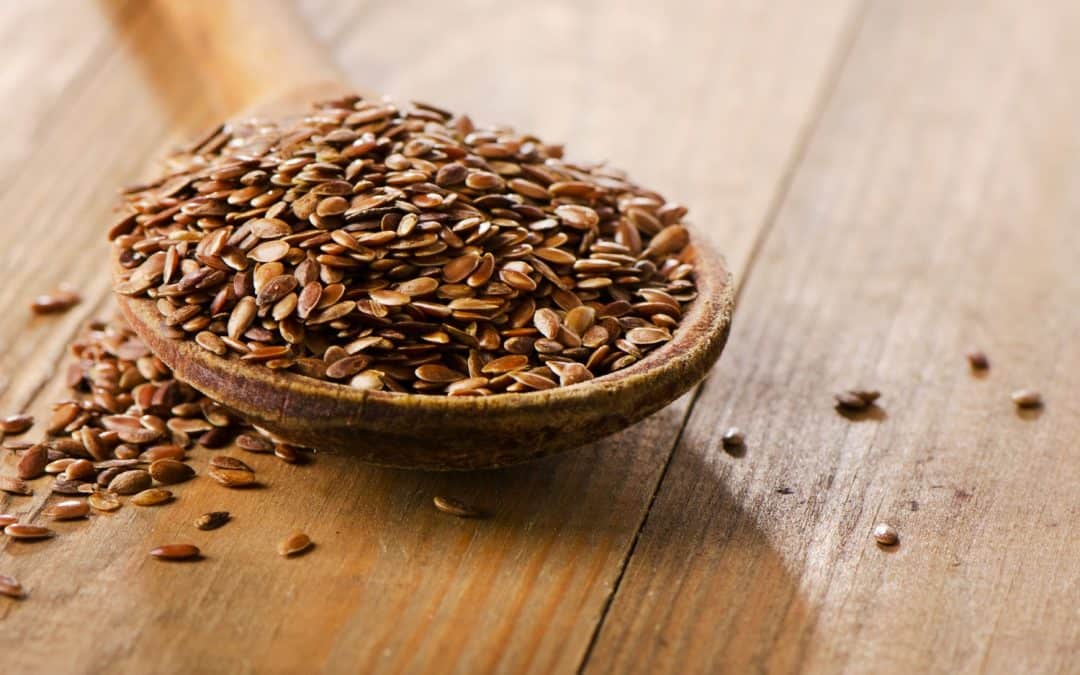Linumusitatissimum, also known as common flax or linseed, is a food and fiber crop cultivated in cooler regions of the world. The meaning of the word flax in latin is “most useful” since every part of the flax plant is utilized. Flax is one of the oldest cultivated crops and it is grown for its seeds and fibers. The seeds can be ground into a meal or turned into linseed oil, which is one of the oldest commercial oils. The oil is used as a nutritional supplement and as an ingredient in many wood-finishing products. Flaxseed has been used in ayurvedic medicine for thousands of years, it has a high nutritional value and its benefits include helping improve digestion, skin, cardiovascular health, cholesterol and hormone balance.
Supports Digestive Health
One of the well-researched benefits of flaxseed is its ability to promote digestive health. The Omega 3 fatty acid (ALA) in flax can help reduce inflammation and protect the lining of the GI tract. Flax is very high in soluble and insoluble fiber, which means it’s very helpful for maintaining normal bowel movements. Because it can help bulk up stool and flush waste from the GI tract due to its gel-like quality, flaxseed is considered one of the best natural remedies for constipation. You’ll also benefit from getting lots of magnesium from flax, another nutrient that promotes digestive health by hydrating stool and relaxing the muscles in the GI tract.
Benefits the heart
Thanks to the omega 3 fatty acid content of flaxseeds, a daily intake could lessen the risk of arrhythmias (irregular heartbeats), high blood pressure, inflammation, high blood cholesterol levels and other related conditions. Flaxseed contains a well amount of water-soluble fiber which lowers blood cholesterol.
Reproductive health for women
Flaxseed is rich with Lignans that have estrogenic properties. In fact, flaxseed can be used as an alternative to hormone replacement therapy in some cases or as a complementary approach to balancing hormones in menopausal women. It can promote lactation in pregnant women and due to its ability to balance estrogen; flaxseeds may also help reduce the risk of osteoporosis. It can even help menstruating women by helping to maintain cycle regularity, such as encouraging a normal length luteal phase (the period between ovulation and menstruation).
Nutritional support
Flax contains hundreds of times more lignans than other plant foods (Lignans are phytoestrogens, which are estrogen-like chemicals and also act as antioxidants). In addition flaxseed contains high levels of protein, dietary fiber, several B vitamins, and Omega-3 fatty acids. They are also especially rich in thiamine, magnesium, potassium, and phosphorus.
Consumption and storage
Whole flaxseeds are chemically stable, but ground flaxseed meal, because of oxidation, may go rancid when left exposed to air at room temperature in as little as one week.Refrigeration and storage in opaque sealed containers will keep ground flaxseed meal for a longer period before it turns rancid.
Flaxseed should be grounded to meal or sprouted for proper digestion, and can be used in baking or added to shakes and yogurt. Because they absorb a high amount of liquid they can be used as a thickening agent or as an egg substitute. In northern India, flaxseed is traditionally roasted, powdered, and eaten with boiled rice, a little water, and a little salt.
Beware that excessive consumption of flaxseeds with inadequate amounts of water may cause bowel obstruction, so always remember to soak the grounded meal or consume it with enough liquids.
Properties
Type: Seed
Element: Earth
Color: Brown/Yellow
Taste: Sweet, Bitter
Natural Attributes: Oily, heavy, Sticky
Dosha impact: Vata -’, Pitta +, Kapha +
Tissue impact (Vipak): Nourishing
Thermal impact (Virya): Heating
Digestive impact (Agni): Relatively easy to digest
Moves energy: Downwards
Channels (Srotas): Opens
Strength (Bala): Improves strength and immunity
Sturdiness (Ojas): +
Mind (Manas): Sattvic
Feces: Laxative
Urine: Diuretic
Occasion: Autumn, winter, spring
Nutrient: Omega 3 Fatty Acids, Soluble Fiber, Protein
Chinese medicine syndromes: Kidney Yin and Yang Deficiency, Dryness of the Lungs and Colon
Medicinal properties
- Nourishment (rasa): Nutritive
- Blood-circulation-liver:Cardiotonic, Hypoglycemic, Antiplatelet
- Nervous system: Analgesic
- Reproductive and hormonal systems: Increase sexual power, Emmenagogue, Galactagogue
- Immunity: Anti Inflammatory, Antioxidant
- Skin: Emollient
- Kidney-Bladder: Diuretic
- Respiratory system: Expectorant, Demulcent
- Digestive system: Laxative
Harmful for:

